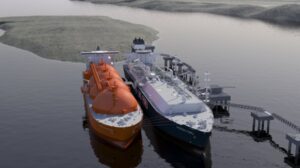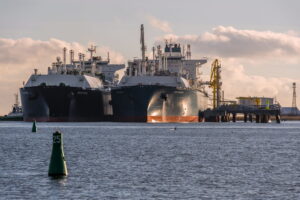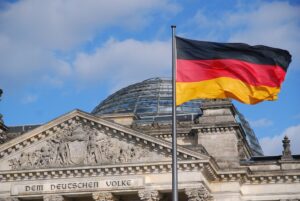As every year the thematic track titled „Europe of the Carpathians” kicked off at the 27th Economic Forum in Krynica. It was opened by a panel on cooperation between the Three Seas Initiative countries.
Three Seas Initiative is to protect the region’s sovereignty
In his opening speech, the Speaker of the Sejm Marek Kuchciński talked about the traditional ties of „Europe’s distinctive center.” He mentioned the cooperation between Poland and Ukraine, Romania and the Balkans. He also stated that the Carpathians were Europe’s environmental backbone. „The Carpathians cooperation is a new formula, which should make actions more attractive and strengthen them.”
According to the Speaker, the foreign policy of the countries had common aspects: Europe of the Carpathians, Three Seas Initiative, the Visegrad Group, parliamentary summits. He also ensured the states cooperated when it comes to their economy, energy and environment. „This cooperation will strengthen our position and sovereignty in Europe, so that our interests are not ignored,” he assessed. The Via Carpathia road project is to be an example of successful cooperation.
A video that promotes Europe of the Carpathians presented the region’s qualities, which included its most important environmental resources: large water reserves, the highest number of national parks. Another important factor was the diversity of religions and cultures.
The panel on the Three Seas Initiative, which is a presidential initiative with a goal to deepen economic integration within the European Union, was devoted to a number of subjects, including transport connections, gas market integration, cooperation in cyberspace, telecommunication and environmental protection.
Poland acknowledges the Three Seas Initiative is a necessity
„There is no need for a political confirmation of this idea. It is time for it to enter a practical stage. I hope that soon you will witness important decisions made by the Three Seas countries with regard to the practical tools of implementing this initiative,” Krzysztof Szczerski, Chief of the Cabinet of the President announced.
„Today in Europe there are tendencies to divide Europe, to talk about our countries as the continent’s worse part. This is happening again to meet the needs of internal politics in many countries, and projects to build a multi-speed Europe are appearing, such as military cooperation, limiting of Schengen and installing borders within the European Union. Our region stands to lose the most because of these divisions and reestablishing borders in Europe,” the minister added.
He also reminded that rather than implode Europe should expand by welcoming Georgia or Ukraine. „If we start to split Europe into different areas, we will start losing more countries. When we limit Schengen we will lose Croatia and Slovenia. When we separate the Euro zone we will lose Poland among others. When we separate a security area without NATO we will lose the Baltic States. Slovakia and Slovenia will be left. These are the two countries in this part of Europe which are divided by these borders,” he warned. In order to prevent this Central Europe has to become '”too big to fail,” too big to be ignored.
Warning from Hungary
„Hungary is in the center of the Three Seas Initiative, so we are obviously interested in this. I am talking about transportation, roads and railways, energy cooperation or telecommunications and cyber security,” said Janos Latorcal, Vice Speaker of the National Assembly of Hungary. „We have an idea so it is time to implement it, but it is a task for the governments.”
„When it comes to energy cooperation we have to shore up our gas sources. We are completely dependent. If we were really able to strike an agreement on US LNG deliveries, it would be a completely new dimension of security for the whole of Europe and especially for our region.”
„We need to be very cautious here. We should have been cautious in 1993 when Italians promised us gas deliveries from Northern Africa and construction of a second pipeline to deliver the gas. The pipeline was supposed to deliver gas to Europe via Trieste. Today we know what is left from this initiative. We know how much needs to be done and this is the core of our initiative,” the Hungarian Speaker warned. He also stressed he was hoping the Three Seas Initiative would be able to acquire EU funds for the necessary projects.
Support from Croatia
Damagoj Ivan Milosevic, chairman of the European Issues Committee at the Croatian Parliament also took part in the discussion. „The Three Seas Initiative offers good responses to the challenges the region is facing,” he stated. He also reminded that apart from Austria all Three Seas states belong to NATO, so they agree on matters of security. Migration was another subject that united all countries of the region.
„We believe that the LNG terminal on the Isle of Krk will be launched in the next two years. This will increase the region’s energy security,” he added.
Lithuania looks at geopolitics and thanks for support
„Lithuania is not close to the Carpathians. Historically we are closer to the Baltic Sea. We perceive the Three Seas Initiative from the point of view of that sea,” said Andrius Kubilius, former prime minister and current MP.
„We need to integrate our infrastructure not only because of economic reasons. This is also a geopolitical need like roads, railways and energy. In order to achieve this we need good political will on the national level and then good regional cooperation and European solidarity,” he assessed. However, he also pointed out to the more down-to-earth problems, such as the state of roads in Poland and Lithuania.
„Infrastructure is also important for energy independence. We were the first ones to create the energy package and open Europe’s first LNG terminal. While we are still buying from Gazprom, we have also started to purchase from Norway and recently the USA,” Kubilius explained. „Once the connections with Poland are completed, the region will be using Polish and Lithuanian terminals. The same pertains to the power generation sector. We have connections with Poland and Sweden, which allows us to trade.”
„We are in a state of a hybrid war, a nuclear power plant is being built in Ostrowiec, 20 km away from Vilnius. This power plant is Moscow’s geopolitical project, implemented in that location on purpose. We have talked to the Polish government and received a confirmation that it will not import energy from Ostrowiec because of the above reasons,” the Lithuanian reminded.
Poland bets on gas diversification
The Government Plenipotentiary for Strategic Energy Infrastructure, Piotr Naimski spoke about the Initiative’s energy security. „Energy cooperation is the Initiative’s most difficult task. We are the closest to a situation where we will have diverse gas sources in the region. It is doable in the foreseeable future. Our friends from Croatia have ensured us that the Krk terminal will be launched in the next two years. Świnoujście already has a functioning LNG terminal. On Saturday another ship from Norway will deliver gas there. We have decided to expand the facility and we will do this quickly.”
„Our project to build a gas pipeline to Denmark and to Norwegian gas fields is being implemented in line with the schedule. Actually today the second phase of the open season kicked off and the first one was a success. In the next few years we will be able to say that we have implemented a strategic project which diversified gas deliveries to Europe,” Naimski said. „The situation looks differently when it comes to electricity and oil. Poland is enjoying a good position because we can import the raw material via the sea, which practically means our sources are fully diversified. It is not the case for our Three Seas partners. It will be more difficult.”
„The road infrastructure is about Via Carpathia, in Poland that is a section of the S19 road. Sections to Latvia and Estonia are under construction. The north-south road will be completed in the foreseeable future,” he added.
„If the cooperation between the Adriatic, Black and Baltic Seas is able to thrive in its diversity, it will be our contribution to fixing Europe,” Naimski said.








